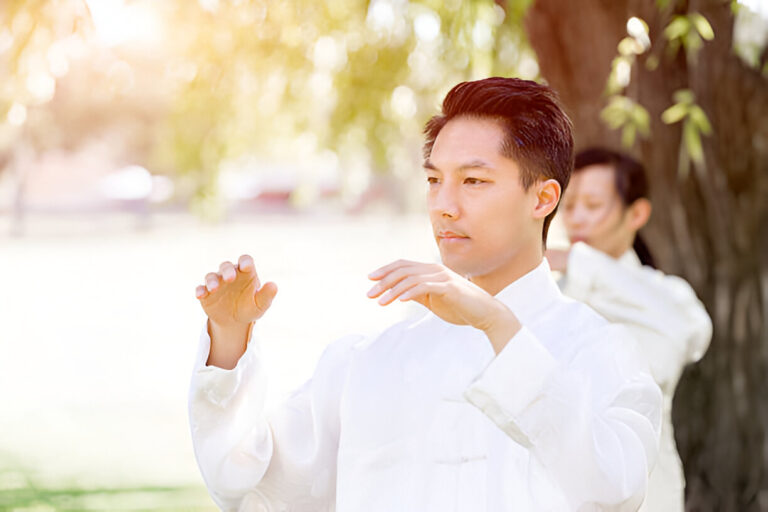Key Takeaways:
- Qigong offers numerous physical and mental health benefits.
- Online classes can make Qigong more accessible to a broader audience.
- Incorporating Qigong into your routine can help manage stress and increase overall well-being.
What is Qigong?
Qigong is an ancient Chinese practice involving movement, meditation, and controlled breathing. The goal is to harmonize the flow of “Qi,” or vital energy within the body, which is thought to enhance physical and mental well-being. This practice has roots in traditional Chinese medicine and martial arts, making it a holistic approach to wellness. In today’s fast-paced world, the relevance of Qigong has only grown. With the advent of the digital age, qigong classes have become more accessible, allowing people to practice from the comfort of their homes and eliminating barriers like commuting or rigid schedules.
Physical Health Benefits
Engaging in Qigong can lead to numerous physical benefits. Studies have indicated that consistent physical activity can significantly enhance heart health by reducing blood pressure and boosting heart rate variability. Furthermore, the gentle motions of Qigong also increase flexibility, preventing injuries and enhancing overall physical strength. It is particularly beneficial for those suffering from chronic conditions such as arthritis, where improved joint mobility can improve their quality of life. Furthermore, the practice helps alleviate chronic pain by promoting better circulation and muscle relaxation and improving balance, which is very important for older adults to reduce the risk of falls.
Mental Health Advantages
In addition to physical health, Qigong can significantly impact mental well-being. Practicing Qigong regularly can reduce stress, anxiety, and symptoms of depression. The practice incorporates controlled breathing and mindful movements, enabling people to reach a state of peace and tranquility. The rhythmic breathing and gentle movements promote a meditative state, which can be particularly beneficial for managing chronic stress. According to recent studies, the mental health benefits of Qigong also extend to improved focus, concentration, and emotional balance. By reducing cortisol levels—the body’s primary stress hormone—Qigong can help create a more resilient mindset.
Accessibility of Online Classes
With the proliferation of digital platforms, Qigong classes have become more accessible. Online classes allow individuals to engage in this ancient art at their own pace from the comfort of their own homes. These classes cater to beginners and advanced practitioners alike, making it easier for anyone to integrate Qigong into their daily routine. Online platforms provide flexibility; you can practice any time that suits your schedule. Additionally, many platforms offer structured programs that guide practitioners through different difficulty levels, ensuring a comprehensive learning experience. This adaptability is priceless for individuals with hectic schedules or residing in regions without traditional Qigong classes available.
Integrating Qigong into Daily Life
Incorporating Qigong into your daily life doesn’t have to be a daunting task. Start by dedicating just 10-15 minutes each day to practice. As you become more comfortable with the movements and techniques, gradually increase the duration of your practice. Having a consistent Qigong practice is essential to experience the positive effects, and even brief daily practices can result in noticeable enhancements to one’s health in the long run. Many platforms offer step-by-step guides and resources to help you establish a consistent routine. Setting reminders, joining online forums for motivation, and tracking your progress can make incorporating Qigong more manageable and enjoyable.
Real-Life Examples
Take, for example, Jane, a professional working a demanding 9-5 job who struggles with chronic stress. She incorporated Qigong into her morning routine, spending just 20 minutes each day practicing. Over time, she noticed significant improvements in her stress levels and overall energy. Her productivity at work also increased as she felt more focused and calm. Similarly, Mike, an older adult, improved his balance and reduced joint pain through consistent Qigong practice. He found relief from his chronic back pain and felt more stable in his day-to-day activities. These real-life examples highlight how Qigong can seamlessly integrate into daily life to enhance overall well-being.
Finding the Right Class
Choosing a suitable Qigong class is essential for maximizing the benefits of your practice. Look for reputable instructors with extensive experience and positive reviews. Online forums and community reviews can be instrumental in helping you narrow down the best options. The goal is to find a class that suits your experience level and schedule. Many online platforms offer trial classes, allowing you to experience the teaching style and class structure before committing. Specific platforms also offer customized suggestions tailored to your objectives, simplifying finding the ideal class.
Conclusion
Qigong is a beneficial practice that provides many advantages for physical and mental well-being. By making Qigong accessible through online classes, more people can experience the advantages of this ancient art. If you are looking to decrease stress, boost flexibility, or improve general well-being, incorporating Qigong into your daily routine can be beneficial. The essential strategy is starting small, maintaining consistency, and embracing the journey towards improved health. As you delve deeper into the practice, you’ll likely find that the benefits extend beyond the physical, fostering a holistic sense of well-being and inner peace.

